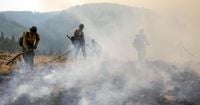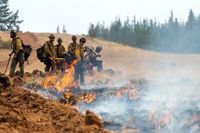On a crisp Wednesday morning in late August 2025, as the Bear Gulch wildfire raged through nearly 9,000 acres of rugged terrain in and around Washington’s Olympic National Park, an unusual and controversial scene unfolded at the fire’s edge. Federal immigration agents arrived at the front lines—not to battle the flames, but to arrest two firefighters accused of being in the United States illegally. The move, described by veteran firefighters as nearly unprecedented, has since sent shockwaves through the wildland fire community, raising urgent questions about immigration enforcement, public safety, and the nation’s reliance on immigrant labor in critical emergency roles.
The Bear Gulch fire, which broke out on July 6, had by August 27 scorched approximately 14 square miles and was only 13 percent contained, according to Reuters and Associated Press reports. Two work crews, many composed of Mexican contractors with valid work visas and passports, had gathered at a staging site near Lake Cushman around 9 a.m. when U.S. Customs and Border Protection agents appeared, according to crew boss David Diaz as told to NBC News. Videos captured by crew members show the agents detaining the two men, who were handcuffed and escorted away. The operation, officials later said, was prompted by a Bureau of Land Management (BLM) investigation into discrepancies on contractor rosters.
“They were told they were going to cut firewood,” Scott Polhamus, secretary of the Organization of Fire Contractors and Affiliates, explained to Stateline. “The people that were supposed to meet them never showed up, and eventually immigration showed up instead.” Polhamus emphasized that immigrant workers make up a huge portion of the forestry and fire workforce, calling them “an integral part of this industry.”
In total, Border Patrol agents checked the identities of 44 crew members, arrested two on suspicion of being in the country illegally, and removed 42 others from the fire scene, according to statements from U.S. Customs and Border Protection and Benzinga. The government subsequently terminated its contracts with the involved companies, including Table Rock Forestry Inc., which had provided documentation showing its workers held legal H-2B visas. Yet, even with paperwork in order, the company’s crew was demobilized and sent home due to what Polhamus described as a half-hour discrepancy on a timesheet.
For many in the wildland fire community, the timing and manner of the raid were deeply troubling. Bobbie Scopa, a 45-year firefighting veteran and executive secretary with Grassroots Wildland Firefighters, told Stateline, “There’s a lot of brown bodies out there on the fire line. When the rumble from this goes around, we’re going to have contractors unable to put out as many crews as they were. We don’t know what the requirement is not to get shipped off by ICE. Even if you’re a citizen and you look the wrong way, you could still get picked up.”
Washington’s Public Lands Commissioner Dave Upthegrove did not mince words, stating, “The Trump administration’s crude and inhumane approach to immigration enforcement has intentionally and unnecessarily stoked fear and mistrust among members of the public—including firefighters putting their lives on the line to protect our State.” Senator Patty Murray echoed the condemnation, calling the policy “fundamentally sick” and demanding “immediate answers” about the circumstances of the arrests and the government’s policy regarding immigration enforcement during active wildfires. “Here in the Pacific Northwest, wildfires can, and have, burned entire towns to the ground. We count on our brave firefighters, who put their lives on the line, to keep our communities safe—this new Republican policy to detain firefighters on the job is as immoral as it is dangerous,” she told The Independent.
Legal challenges quickly followed. Stephen Manning, a Portland attorney representing one detainee, described his client as an Oregon resident who had been in the U.S. for 19 years after arriving as a four-year-old. Manning asserted that his client was “unlawfully detained” and on track for legal status after assisting federal investigators in a crime against his family—a status protected by the U visa program, which Congress established to shelter victims of serious crimes who cooperate with law enforcement. Manning argued in a letter to Senator Ron Wyden that the arrest violated Department of Homeland Security policies prohibiting immigration enforcement at emergency response locations and of individuals applying for victim-based immigration benefits. “Charging the man with an immigration violation was ‘an illegal after-the-fact justification’ given his U visa status,” Manning told the Associated Press.
Despite these claims, a Department of Homeland Security spokesperson maintained that the two detained individuals were not actively fighting the fire but were instead providing support services, such as cutting logs into firewood. “The firefighting response remained uninterrupted the entire time,” the statement read. “No active firefighters were even questioned, and U.S. Border Patrol’s actions did not prevent or interfere with any personnel actively engaged in firefighting efforts.” Jennifer Risdal, a spokesperson for the U.S. Forest Service’s Incident Management Team, echoed this view, stating to AP that “the Border Patrol operation is not interfering with firefighting activity and Bear Gulch firefighters continue to make progress on the fire.”
Still, the broader implications were clear. Many experts and advocates warned that such high-profile raids could have a chilling effect on the ability to staff wildfire crews, especially during the West’s peak fire season. “If you’re a migrant worker and this starts happening, are you going to keep on doing that and risk getting picked up?” Scopa asked. “If [immigration authorities] keep visiting fire camps, we will definitely have fewer contract crews.”
The incident also highlighted the evolving landscape of immigration enforcement under the Trump administration, which has ramped up efforts to target immigrants defying deportation orders, imposing fines totaling $6.1 billion and detaining thousands, according to Reuters. ICE officials have drawn criticism for high daily arrest quotas, which some say have swept up not only undocumented immigrants but also green card holders and visa holders.
On the ground, the Bear Gulch fire continued to burn, with crews—now short-staffed—working to contain the blaze. The number of personnel had dropped from 349 to 303 by Friday, AP reported, as evacuations continued and the fire remained only partially contained. Meanwhile, lawmakers and legal advocates pressed for answers and accountability, with Rep. Emily Randall (D-Wash.) visiting the Tacoma ICE detention center where the two firefighters were held, only to be denied entry.
As the embers of the Bear Gulch fire smolder, the reverberations of the arrests linger—not just for the two men detained, but for the hundreds of immigrant firefighters who risk their lives each season, and for the communities that depend on them when disaster strikes.






